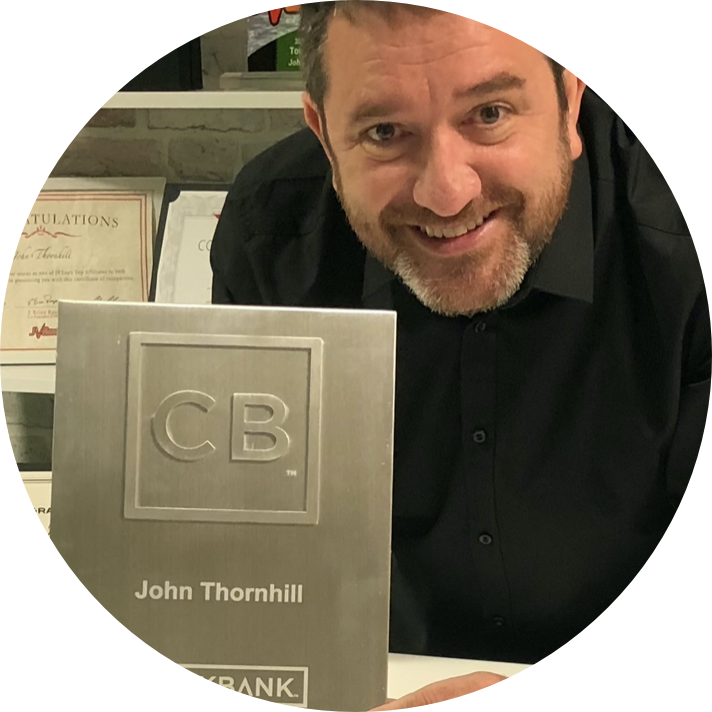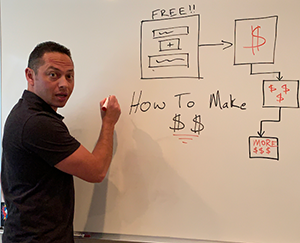Unlocking Your Leadership Potential: From Hero to Human Leader with Empathy written by John Jantsch read more at Duct Tape Marketing
The Duct Tape Marketing Podcast with John Jantsch In this episode of the Duct Tape Marketing Podcast, I interviewed Hortense le Gentil, a world-renowned executive leadership coach, speaker, and author. With over 30 years of experience across various industries, including media consulting and advertising, Hortense guides CEOs and senior executives on their journey from hero […]
Unlocking Your Leadership Potential: From Hero to Human Leader with Empathy written by John Jantsch read more at Duct Tape Marketing
The Duct Tape Marketing Podcast with John Jantsch
In this episode of the Duct Tape Marketing Podcast, I interviewed Hortense le Gentil, a world-renowned executive leadership coach, speaker, and author. With over 30 years of experience across various industries, including media consulting and advertising, Hortense guides CEOs and senior executives on their journey from hero leaders to human leaders.
Key Takeaways
Join Hortense le Gentil on a transformative journey as she discusses the evolution of leadership in today’s world. Learn to identify and overcome mental obstacles, embrace authenticity and vulnerability, and lead with empathy. Gain actionable insights into unlocking your true leadership potential and thriving in both your personal and professional life. Whether you’re a seasoned executive or an aspiring leader, Hortense’s expertise will empower you to inspire and connect with others on a deeper level, driving sustainable growth and success in today’s rapidly changing landscape.
Questions I ask Hortense le Gentil:
[01:08] What is a mind trap and how does it impact us?
[02:06] How is a mind trap different from a limiting belief?
[02:48] Tell us the personal case study of when you were stuck 15 years ago?
[04:46] What do you do when you can’t trust that inner voice?
[06:41] Explain the concept of transforming from a hero leader to a human leader ?
[08:58] What does the process of unlocking yourself as a human leader look like?
[13:54] How does a leader help their team adjust to their embracing empathy?
[16:25] Is there a level of self awareness needed to embrace empathy as a leader?
[16:56] Do you get some pushback from experienced leaders who deny the relevancy of developing their consciousness?
[17:47] What is the one tip you have for beginners looking to start unlocking their leadership potential?
[18:45] Where can people connect with you, learn more about your work and pick a copy of your book?
More About Hortense le Gentil:
- Connect with Hortense on LinkedIn
- Visit her Website
- Grab a copy of The Unlocked Leader
Like this show? Click on over and give us a review on iTunes, please!
Connect with John Jantsch on LinkedIn
This episode of The Duct Tape Marketing Podcast is brought to you by Work Better Now
Visit WorkBetterNow.com mention the referral code DTM Podcast and get $150 off for your first 3 months.
John (00:08): Hello and welcome to another episode of the Duct Tape Marketing Podcast. This is John Jantsch, and my guest today is Hortense le Gentil. She’s a world renowned executive leadership coach, speaker and author. She guides CEOs and senior executives on their journey. From hero leaders to human leaders guided by 30 years in business, working across industries, including media consulting and advertising. And as an entrepreneur, she’s the author of a book we’re going to talk about today, the Unlocked Leader, dare to Free Your Own Voice, lead with Empathy, and shine your light in the world. So Hortense Bienvenue.
Hortense (00:49): Thank you for having John. Happy here.
John (00:52): That’s all of the French that I’m going to attempt today, but I nailed that one, didn’t I?
Hortense (00:57): Oh, you did great. You just love this one.
John (01:01): Alright, so in the book there is a concept called you call Mind Traps. That’s a big part of the book. So let’s start there and let’s define what a mind trap is and how it impacts us.
Hortense (01:14): I’d like to say that the mind trap is, it’s a mental obstacle that is on your way to move forward. This is something that holds you back. It can be something that you used to be, for example, like I used to be perfect or to try to reach perfection. It was a driver for me, but now I feel like it doesn’t work anymore. So when you feel like something is hold you back, holds you back, and you can even feel unhappy and satisfied, you cannot be completely yourself and journeys happen to everyone. I dunno if it happened to you, but every moment, a lot of moment in our life, it happened to us and it happened to me and I remember it was more than 15 years ago.
John (02:04): So let’s get into that. But I want to clarify how is that different than excuse, than a limiting belief? I’m not good enough to lead or something. How is it different from that?
Hortense (02:14): So let’s say that can be cousin. They can be cousin because mine trap is really for me, it’s where you are stuck. So limiting belief when you think I’m not enough, for example, yes, that could be because this is a consequence, let’s say because you are trapped somewhere and then you begin to think, okay, why do I think like that? What is behind that? The scene. So behind the scene you will find the real reason, and this is what I call the mind trap.
John (02:48): So let’s use your example that you were starting to bring up there from 15 years ago to maybe even help clarify that further.
Hortense (02:54): Okay, yes, no, I just wanted to explain that. 15 years ago I felt completely lost and stuck in my life, personal life and professional life. And then I was lost, John, I didn’t know what to do. And then of course everything went south and I went stuck in bed for months. So I had plenty of time to think. And then at that time I had the dream. I had the dream. And my grandmother, it was a grandmother that I just loved and she came back in my dream and she told me something very simple. She told me, you have to find the bus of roses. And I had no idea it was a pass of roses. So I asked her in my dream and I said, okay, where is that and where is it? Because more important, where is it? I want to find the rose.
(03:46): And she said, you just look at me and smile. And she said, you know where it is. And then I woke up. Of course I was furious. She didn’t give me the answer, but I will understand later what she meant was very important. She meant that I had to listen to my inner voice. And very often this is why we are stuck somewhere because we are not listening our own voice. We are not confident enough because it can be risky, it can be difficult. You need to be courageous to take sometimes difficult decision. And then this is what I learned and when I began to listen to my own voice, yes I could do that. Yes, I could change my life personally and professionally. Yes, I could do that and that this is what I did and I began to free myself.
John (04:35): Alright, so what if you can’t trust that inner voice? I mean there’s a lot of things that we call an inner voice that are telling us things that aren’t together altogether positive. I mean, how do you tell the difference between yeah, that’s the right guidance as opposed to that’s just continue to keep me locked.
Hortense (04:51): Interesting. Okay, listen. So what we know, I think it’s more a feeling. So when you want to take a decision, whatever the decision is, I think we know the decision. And when it’s a hard decision to take, we need someone with who that shares this decision. And you’re looking for someone who say yes, do it. But sometimes you can wait a long time before anybody is like, I agree with you. So I will say that this voice is the one that you feel. So we all know exactly what we should do and sometimes we are not ready. But one day when you are stuck, it’s time to face that and to listen to that voice. So what do you really want to do and not the voices behind that because of course when you are stuck somewhere, you need to track the source. So who said you that, for example, who said that you cannot be a CEO, for example. I had a client like that and who said that it was a professor, it was a teacher years ago, this professor was told that young person that you will never be a CEO because I can see all the emotion on your face.
(06:12): And so it was so surprised. So we are making association because we are living with the voices that the community authority, whatever the voices around us and also our brain is cooking voices for us because we are looking for meaning. Okay, why? Yes, I should do that. No I don’t all the time. So silence,
John (06:38): I think I read it in your intro, but it certainly shows up in the book, this idea of taking people from the hero leader to the human leader. Explain that concept.
Hortense (06:49): You know that we need to free ourself from those mind trap to become human leader. And what should we become human. It’s because the world has changed and the expectation has changed. Also, people now they want to connect with you. They don’t need another hero like said, no, we don’t need another hero. We need someone with who we can relate, we can understand, we can connect. And the only way to do that is by being human, by using your secret weapon. That is the empathy. And you need that. And I think that every leader know that because a lot have been said about why we should lead with empathy. But when it comes to the how do we do that and you need courage to do it, it’s very courageous because you have to unlearn what you learned. But it’s another dimension I would say. So now you have to inspire and take care of people. It’s completely different.
John (08:00): And I think a lot of leaders fall into the trap of believing I have to have this strong front that I’m in charge of everything, I have all the answers. And that’s probably an aspect that right or wrong holds a lot of people back, doesn’t it?
Hortense (08:14): Exactly, exactly. Because we are raised like that. Your education at school, I’m sure everyone was telling you, oh don’t show your emotion, right? And how all the answer, but who has all the answer? John, tell me. Who could predict a pandemic? Who can predict every, can we say that we are living in a crazy world today, every day something happen? How can you alone have all the answer? That’s absolutely not possible.
John (08:48): So the core concept of the book of course is unlocking yourself as a leader. What does that process look like? Obviously it’s very drawn out in the book, but give us the high level. What is the process of unlocking yourself as a leader look like?
Hortense (09:01): So it’s going to this process of, okay, be aware that we are locked and okay, are we ready to start this journey? Because it’s a journey, it’s not a destination. And how we do that. So we face our fears first because we are afraid. Maybe we are used to do another way. You need to change. And then we go to, okay, where am I trap? Where I am stuck? And you track the source like who said? And then when you track the source, you found the source. Then you go to what I call the mind shift. So you change your mindset and with some questions, powerful questions you ask yourself. Okay, so you track the source and you said, is it true? Is it relevant? Is it helpful? What I’m thinking right now? And then you’re let go and then you are free yourself and you are able to write your own story.
(09:57): But maybe let me share very quickly an example. So I have this client, he was considered to be the next EO of the company. And so he went through a process in front of a panel of their leaders in order to be the next CEO. And then out of nowhere, out of the blue, his behavior changed and he became very talkative. He was talking all the time, didn’t listen, he changed completely. So he was surprised. Everybody was surprised. And of course he didn’t get the job. Then we had this conversation and he told me, I don’t know, I don’t know what happened, tto, I don’t know. I said, okay, so let’s figure out. And then revisiting his life, he remembered that years ago he had to pass an exam, not to pass an exam, it has to be in front of a panel of teachers.
(10:54): And then one of the teacher didn’t let him talk. So he was shocked. It was a trauma, one of the cos when what is behind it became a trauma. And then it was the same story that I shared before. This teacher told him, I don’t know what you’re going to do young guy, but you will never be a CEO because I can see all your emotion on your face. Young guy, very smart, begin his life thinking that you don’t have to show your emotion. And second, he was not aware. He forgots his conversation, but his unconscious didn’t. And the way the day, the first opportunity that unconscious has to remember that talk in order to not have the same situation that he had before. So going through this process of you track the source, where it’s coming from, it was coming from there. In this case there were trauma and voices.
(11:58): So they are the two main families, the source of your mind trap. So he found the source and then I asked him is the three question, is it true? Is it relevant? Is it helpful today that you cannot be a CEO and you don’t have to show your emotion? He said, no, I know. I said, okay. So we let go. So we walk on, let go. And then you begin to write your own story. What is important for you? How you want to be? Remember, how do you want to show up as a leader, what difference you want to make in the world or around you and all that? What have your values? And you begin to write your own story because you don’t. You live your own life. You don’t live the life that someone wants for you.
John (12:48): And now a word from our sponsor, work better now. Work better now provides outstanding talent from Latin America, hand matched to your business with over 40 roles across various industries, including marketing. They’re a reliable partner for consistently finding the perfect fit for your business. Simply tell them what you need and they’ll handle the rest hassle-free. We have two work better now, professionals on our team, a marketing assistant and a marketing coordinator. And we’ve been blown away by their abilities, responsiveness, and professionalism. They’ve really become an essential part of our growing team. And to top it off, each dedicated and full-time work better. Now professional is 2350 per month and there are no contracts to schedule a 15 minute consultation with a work better now rep and see how they’ll support your business growth goals, visit, work better now.com. Mention the referral code DTM podcast and you’re going to get $150 off for your first three months. That’s work better now.com. And don’t forget that DTM podcast code. So after you’ve worked with somebody or somebody goes through this process and they are embracing empathy, they are becoming maybe more human, but that’s not how their team has experienced them to date. Is that a bit jarring? It’s like, where’s the old John? Or does it just take consistency and proving that you mean it
Hortense (14:16): So good? Of course, but what I recommend very often is it’s difficult to change how people think about you. So what I always recommend is to share with your team. So at fun point you say, okay, my name is, and I want to work on being a better leader and connect better with yourself and have more empathy, whatever it is, or communicate better with you. And then your team or your environ is aware, oh, oh great, she want to change, okay. And you ask for help and say, and I need help. And then everyone wants to help you. No worries about that. And then they say, okay, so let’s do it together. Then it’s faster for two reasons. First, they’re aware that you’re doing something and they appreciate the fact that you want to be better. Then you give the tone so they can also be, okay, I can walk also to be better.
(15:17): It’s all right to not be perfect. Then you set the tone and also they help you because you are in the middle of a meeting and things like that. And after you maybe you ask for feedback and said, what feedback do you have for me? Maybe not every day, I mean, but when you feel it or when you decide and then it’s all together that you’re going to work on that. So on your side you do your homework of unlocking yourself and in fact of telling, be sure of the message and vision that you have and really who you are. Connect with yourself because empathy begin to start with yourself first. You have to connect with yourself. Who am I? What do I want? Can you really say how you are to yourself? Can you say that? Who are you? And then when you are very clear on that, because that is a personal walk, when you’re very clear on that, you’re ready to practice, you’re ready to do it. And after, again, it’s a journey. It’s not a destination. So every day we learn something and every day we evolve and then it’s, it’s wonderful because it changed everything.
John (16:25): I imagine a level of self-awareness, or at least a desire to uncover some self-awareness is really the starting point for all this, right? I mean you can’t really do that. You can’t do the work you’re talking about unless you discover some level of self-awareness. Exactly. I mean, would you say that’s accurate
Hortense (16:41): If you don’t know where to start? Yes, that’s absolutely accurate, right?
John (16:45): So a lot of the leadership I have, a lot of people have written books on leadership. I speak with people that have development programs and a lot of them really try to focus on competencies and skills. Do you get some pushback when, I mean you’re literally telling people that they have to develop their consciousness. So do you get some pushback from people that feel like, how is that relevant?
Hortense (17:08): Not that much in fact, because I think if we are honest with ourself, all of us, we know where we have to evolve and we know that part is very hard and we don’t know where to begin when to start, as I said. So no, I don’t think so. And because most of the leader that I know, they know after you need courage to come and to ask for that. So if you’re not ready, if you, but most of the leaders, they are courageous so they can do it, but it’s because you did courage.
John (17:42): Alright, so I’m going to invite people or ask you to invite people where they can connect with you. But what’s one thing, if somebody came to you and said, give me one thing I could start doing today to really unlock my leadership potential, what would that be?
Hortense (17:56): The first thing I think
John (17:57): Everybody always wants the one tip, right?
Hortense (18:00): I know. So the one tip would be, okay, reflect and do the three colon exercise in your life, personal, professional, whatever, both of them is even better. And do first colon, what do you want to keep? What is good in your life? What gives you energy? Second colon, what do you want to drop? What you drain? You don’t want that anymore. And third colon. So what do you want to add to live to your life today? And then begin your journey. What is the first step? Look at that and begin your journey to the process of maybe unlocking yourself.
John (18:41): Love it. Well, I appreciate you taking a few moments to stop by the Duct Tape Marketing Podcast. Is there anywhere you’d invite people to connect with you, learn about your work, and obviously pick up a copy of The Unlocked Leader?
Hortense (18:51): So I have a website, so it’s my name, Hortenselegentil.com. And also we can on LinkedIn, everywhere. On LinkedIn, on social Instagram. So I try to be active.
John (19:05): The book is, we’ll have a link to your website in the show notes, but the book could be purchased pretty much anywhere people purchase books. Again, I appreciate you taking a moment or dance and hopefully we’ll run into you on these days out there on the road.
Sign up to receive email updates
Enter your name and email address below and I’ll send you periodic updates about the podcast.
Recommended Story For You :

How To Make $3493 Commissions Without Doing Any Selling

Successful dropshippers have reliable suppliers.

People Think I Use A Professional Voiceover Artist. NO! I Just Use Speechelo!

Make Money Testing Apps On Your Phone Or Tablet

Make More Money or Lose Everything

Sqribble Is The ONLY eBook Creator You’ll Ever Need.

Work & Earn as an Online Assistant

Create Ongoing Income Streams Of $500 To $1000 Or More Per Day

It's The Internet's Easiest Side Business.


